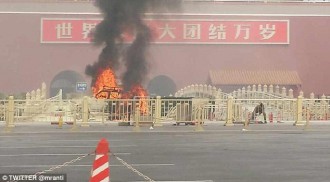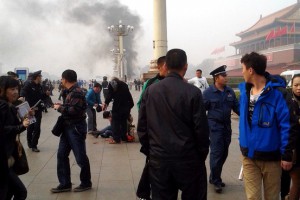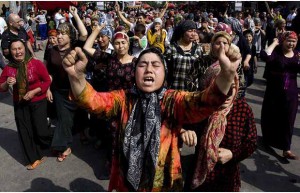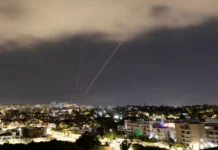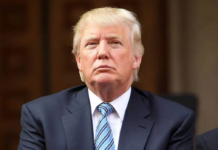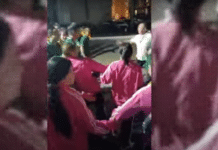Chinese state steps up repression against Uighurs and other national minorities
chinaworker.info
Monday’s deadly incident in Beijing’s Tiananmen Square, one of the most symbolic and heavily policed sites in China, has been classified as a “terrorist attack” by Chinese media today after much initial uncertainty. At around noon on Monday 28 October, a white SUV careered onto the pedestrian area of the huge square, scattering tourists for a distance of 400 meters before crashing and bursting into flames. Five people were killed, including the vehicle’s occupants – identified by Xinhua as Usmen Hasan, his mother Kuwanhan Reyim, and his wife Gulkiz – and 40 bystanders were injured. The vehicle’s occupants have been identified by the authorities as Uighurs – a predominantly Muslim ethnic minority from the vast region of Xinjiang, which borders Central Asia. There are growing and understandable fears this tragic incident will trigger an escalation of repression against the Uighur people and deepen tensions between them and the majority Han Chinese community.
Socialists and the chinaworker.info website have consistently opposed the methods of individual terrorism, which far from strengthening mass resistance to the Chinese dictatorship only increase divisions among the oppressed and make mass struggle more difficult. While much is still unclear and our response must therefore be tentative, it is an incontestable fact that the victims of Monday’s terrifying act were ordinary civilians and tourists, such as the Filipino woman doctor and Chinese man from Guangdong province, who were struck and killed by the vehicle before it crashed. Yet in the longer run those who will suffer most from this event will be the Uighur masses, as this incident will be seized upon by the CCP dictatorship as a pretext for stepping up its iron fist policies in Xinjiang, and also among other non-Han peoples such as Tibetans and Mongolians. The state’s use of repression in pursuit of ‘stability’ in minority areas – which produces the opposite result as we can see – is a testing ground for similar repressive measures against Han Chinese workers and farmers when they fight for their rights.
Crackdown
Beijing police have since confirmed the arrest of five people in the capital in connection with Monday’s crash, all from the Uighur minority. Uighur rights groups are understandably deeply shaken by these events, anticipating a new “fierce state crackdown” from the authorities. Xinjiang, where Uighurs make up 46 per cent of the population and a clear majority in the poorer rural areas, has seen an upturn in violence since 2009 when major inter-ethnic clashes resulted in almost 200 deaths. Based on news reports from the region that admittedly are not reliable, the last few months have been particularly bloody even by the standards of Xinjiang.
Seven Uighurs were shot dead by police in separate incidents in October, according to Radio Free Asia. Authorities have explained the shootings as part of an anti-terrorist sweep, but the dead include an entire family in Hankowruk village – the father and three sons aged 12, 15, and 18 – shot by security forces for “resisting arrest” according to official sources. In June 35 people were killed in what was officially classified as a “terrorist attack”. One of the suspects named in connection with Monday’s Beijing attack was from the same local area. In August more than twenty Uighurs and at least one policeman were killed in incidents linked to another police raid.
The massive increase in house raids by security forces in the past few years has further fuelled a sense of desperation and anger among Uighurs who face economic discrimination and a suffocating denial of religious and linguistic freedom. 139 people have been arrested recently in Xinjiang for spreading “jihadist” ideas online, with a further 256 arrested as part of a broader nationwide clampdown on online “rumour mongering”.
Third Plenum
The Chinese dictatorship is clearly embarrassed by the apparent audacity of this attack in its ‘backyard’. Outbreaks of terrorism shake the government’s claim that China is building a ‘harmonious’ society. This is also a sensitive time for CCP leaders with the key Third Plenum of the 18th Central Committee set to congregate in Beijing in two weeks’ time, a meeting intended to launch “unprecedented” economic reforms. The media version of Monday’s incident and the police investigation will inevitably reflect the propaganda needs of the ruling elite (as happens even in so-called ‘democracies’).
Terrorist acts are unfortunately not new to China and this is not – as some media have stated – the country’s first case of a ‘suicide attack’. Similarly it would be misleading to associate such attacks with religious or ethnic minorities. The combustible mix of deepening social problems and ever tightening political controls has predictably driven some desperate individuals into the blind and counterproductive path of individual terrorism. In a case that made world news, Ji Zhongxing blew himself up at Beijing airport earlier this year in a protest against police brutality that left him confined to a wheelchair. He survived and was sentenced to six years in jail. In another case disabled construction worker Qu Huaqiang blew himself up in a local government office in Shandong province. His protest was over the poor compensation he was given and the refusal of petition officers to hear his case.
In 2008, a man protesting the demolition of his property drove his vehicle loaded with gas canisters into a government building in Hunan province and the resulting explosion injured 12 people. In the same year, 28-year-old Beijing man, Yang Jia, stabbed six police officers to death in Shanghai in a revenge attack for a savage beating. There was a groundswell of online protests when Yang was executed; such was the sympathy his case aroused. These are just a few of the cases in recent years, and there is no doubt – unfortunately – that this is a trend.
The increase in such acts shows that neither an ‘organized conspiracy’ nor even a minimalistic political programme is needed for desperate acts of terrorism to implant themselves as a feature of the political situation in China. This flows especially from two main ingredients in today’s situation: a regime that increasingly rules through police measures alongside the absence of a mass alternative from the still shackled and unorganised working class.
United struggle of the oppressed
Socialists stress that only mass struggle can defeat dictatorship and solve society’s problems. Explaining Marxism’s very clear opposition to individual terrorism, the great revolutionary Leon Trotsky wrote: “Engendered by the absence of a revolutionary class, regenerated later by a lack of confidence in the revolutionary masses, terrorism can maintain itself only by exploiting the weakness and disorganisation of the masses, minimising their conquests, and exaggerating their defeats. [The Bankruptcy of Individual Terrorism, Leon Trotsky, 1909]
The urgent task in China today is to lay the foundations for united working class struggle against state repression by opposing racism and all forms of persecution whether on religious, political or ethnic lines, and fighting for full and immediate democratic rights, including the right to genuine autonomy or independence for the national minorities if this is their democratic choice. This goes hand in hand with a struggle against the CCP dictatorship’s capitalist agenda of enriching a billionaire elite, which is crushing the masses – from all ethnic groups – under unbearable living costs and increased exploitation. United struggle for a socialist future is the only way forward.

